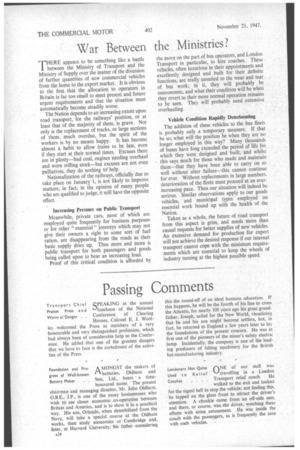War Between the Ministries? .
Page 26

If you've noticed an error in this article please click here to report it so we can fix it.
THERE appears to be something like a battle between the Ministry of Transport and the Ministry of Supply over the matter of the diversion of further quantities of new commercial vehicles from the home to the export market. It is obvious to the first that the allocation to operators in Britain is-far too small to meet present and future urgent requirements and that the situation must automatically become steadily worse.
The Nation depends to an increasing extent upon road transport, for the railways' position, or at least that of the majority, of them, is grave. Not only is the replacement of tracks, or large sections of them, much overdue, but the spirit of the workers is by no means happy. It has become almost a habit to allow trains to be late, even if they start at their normal times. Excuses there are in plenty—bad coal, engines needing overhaul and worn rolling stock—but excuses are not even palliatives, they do nothing to' help.
Nationalization of the railways, officially due to take place on January 1, is not likely to improve matters; in fact, in the opinion of many people who are qualified to judge, it will have the opposite effect.
Increasing Pressure on Public Transport Meanwhile, private cars, most of which are employed quite frequently for business purposes or for other " essential " journeys which may not give their owners a right to some sort of fuel ration, are disappearing from the roads as their basic supply dries up. Thus more and more is public transport for both passengers and goods being called upon to bear an increasing load.
Proof of this critical condition is afforded by the move on the part of bus operators, and London Transport in particular, to hire coaches. These vehicles, often luxurious in their appointments and excellently designed and built for their definite functions, are really unsuited to the wear and tear of bus work; in it, they will probably be uneconomic, and what their condition will be when they revert to their more normal operation remains to be seen. They will probably need extensive overhauling.
Vehicle Condition Rapidly. Deteriorating The addition of these vehicles to the bus fleets is probably only a temporary measure. If that be so, what will the position be when they are no longer employed in this way? Many thousands of buses have long exceeded the period of life for which they were designed and built, and whilst this says much for those who made and maintain them—that they have been able to carry on so well without utter failure—this cannot continue for ever. Without replacements in large numbers, deterioration of the fleets must proceed at an everincreasing pace. Then our situation will indeed be serious. Similar observations apply to our goods vehicles, and municipal types employed on essential work bound up with the health of the Nation.
Taken as a whole, the future of road transport from this aspect is grim, and needs more than casual requests for better supplies of new vehicles. An excessive demand for production for export will not achieve the desired response if our internal transport cannot cope with the minimum requirements which are essential to keep the wheels of industry turning at the highest possible speed.




















































































